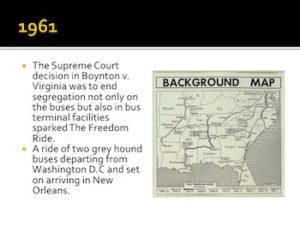
*On this date, 1960, the United States Supreme Court decided Boynton v. Virginia. The case overturned a judgment convicting Bruce Boynton, a Black law student, of trespassing by being in a restaurant in a bus terminal that was "whites only."
It held that racial segregation in public transportation was illegal because such segregation violated the Interstate Commerce Act, which broadly forbade discrimination in interstate passenger transportation. It moreover held that bus transportation was sufficiently related to interstate commerce to allow the United States federal government to regulate it and forbid racial discrimination in the industry. Thurgood Marshall argued the case for Boynton. Justice Hugo Black wrote the majority opinion.
The significance of Boynton is that its outlawing racial segregation in public transportation directly escalated the Freedom Ride movement. African Americans and whites rode various forms of public transportation in the South to challenge local laws or customs that enforced segregation. The Freedom Rides prompted Attorney General Robert F. Kennedy to confront the Interstate Commerce Commission (ICC) with its failure to implement a bus desegregation ruling it had handed down in 1955, Keys v. Carolina Coach Company, as well as the companion train desegregation case, NAACP v. St. Louis-Santa Fe Railway Company, 297 ICC 335 (1955).
By presenting the Commission with its rulings in a May 29, 1961 petition, Kennedy was able to prompt it to do what it had promised in 1955, five years before the Boynton ruling was handed down and six years before the Freedom Riders set out to test Boynton across the Deep South. On September 22, 1961, the ICC issued regulations implementing its 1955 Keys and NAACP rulings and the Supreme Court's ruling in Boynton. On November 1, those regulations went into effect, effectively ending Jim Crow in public transportation.
Historic U.S. Cases 1690-1993:
An Encyclopedia New York
Copyright 1992 Garland Publishing, New York
ISBN 0-8240-4430-4